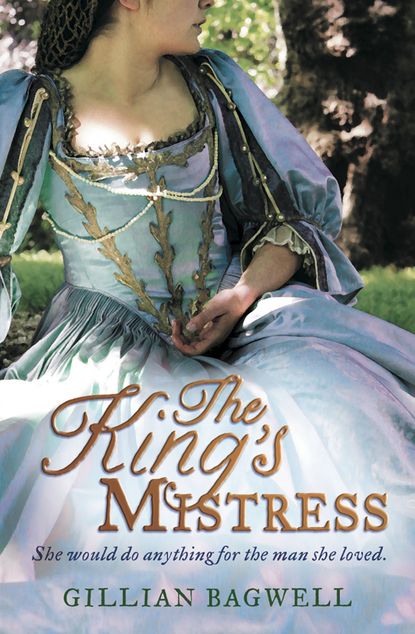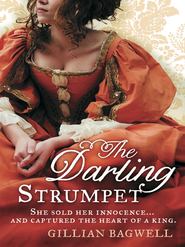По всем вопросам обращайтесь на: info@litportal.ru
(©) 2003-2025.
✖
The King’s Mistress
Настройки чтения
Размер шрифта
Высота строк
Поля
“He’s a big man, over six feet, and well formed.” He noted the look in her eyes and smiled. “Yes, and handsome, too, lass.” Jane blushed. “Of a dark complexion, darker than the king his father. He was wearing a buff coat, with an armour breastplate and back over it, like any officer, but finer, you know. And some jewel on a great red ribbon that sparkled like nothing I’ve ever seen.”
Although the fight must have been terrible, Jane wished desperately that she could have seen the king.
“He was right there among the men in the battle?” she asked.
“Oh, to be sure, Mistress. He hazarded his person much more than any officer, riding from regiment to regiment and calling the officers by name, and when all seemed lost urging the men to stand and fight once more.”
Exactly like King Henry V, Jane thought.
Once more unto the breach, dear friends, once more;
Or close the wall up with our English dead …
“He had two horses shot from under him, he did.”
Jane could imagine the young king so clearly, and she choked back a sob as she remembered that he might well be dead.
“I was there to near the end, I think,” the old sergeant went on. “When there remained just a few of us by the town hall.”
We few, we happy few, we band of brothers …
“All that kept us going was the word that the king had not been killed or captured, so far as any could tell. It was full dark by then, and I was able to slip away by St Martin’s Gate, which our horse still held.”
MANY OF THE FLEEING SOLDIERS WERE SCOTTISH HIGHLANDERS, the upper part of their great kilts drawn up over their heads against the rain, and Jane fancied she saw in their faces bleak despair that went beyond their hunger, discomfort, and defeat in battle. By midday Parliamentary cavalry patrols thundered by on the now-deserted road, and in the afternoon Jane watched a detachment pass with a string of captured Royalist soldiers, their wrists bound, soaked to the knees in mud.
“What will happen to them?” she asked John.
“The Scots will likely be transported to Barbados, or maybe the American colonies. As slaves, more or less, to work on plantations.”
“Inhuman,” Jane whispered in horror. “And the English?”
“Prison. Likely execution for the officers. The men may be spared their lives.”
“Richard,” Jane said. “It breaks my heart to think where he may be. Wounded, perhaps, lying in some field, wet and hungry and in pain.”
Or worse, she thought, but did not speak the words, as if giving them voice had the power to make them real. John put a hand on her shoulder and pulled her closer to him.
“Let’s not think that yet. It may well be that he escaped in safety and is on his way to us even now.”
He kissed the top of her head, and the familiar scent of him, the pungent smell of tobacco smoke, mingled with his own sweat and a slight layering of horse, made Jane feel calm and safe.
THROUGHOUT THE DAY AND EVENING, NEIGHBOURS CAME TO CALL at Bentley to exchange news.
“A Scottish soldier that passed this morning said he had heard the king had been taken prisoner near sunset,” said John’s friend Matt Haggard from Lichfield. “But another swore he had seen the king with his own eyes well after dark.”
“A Parliamentary patrol stopped at the house just at dawn,” said old Mr Smithton. “The captain said he’d seen the king dead, wounded through the breast by a sword. But he looked like a lying whoreson to me.”
Jane chose to believe what the grey-haired sergeant had heard late in the evening, that the king was still free and unharmed. For to let herself think anything else overwhelmed her with grief and terror.
After supper Jane and her father sat side by side reading before the fire in his little study. His companionship, and the persisting in everyday activities, comforted her, helped her believe that all was well or yet might be. The rain beat down outside, and she tried not to think of where Richard might be. John came to the door, and smiled to see his father and sister look up with identical expectant expressions.
“Mother’s gone to bed,” he said. “And Athalia and the girls.”
“Good,” Thomas said. “Better to take comfort in sleep than worry needlessly.”
Jane was surprised to hear the whinny of a horse outside. She ran to the window and peered out, and in a flash of lightning could make out a rider on the drive, leading a second horse behind him.
“It’s not Richard,” she said.
“Who can that be, now?” her father wondered.
“I’ll see to it,” John said, and to Jane’s alarm he took a pistol from a drawer of the desk before he made his way downstairs. He reappeared a few minutes later with William Walker, an old Papist priest that Jane knew as a friend of Father John Huddleston, the young priest who acted as tutor to the boys at neighbouring Moseley Hall.
“You’re wet to the bone, sir,” Thomas cried. “Come down to the kitchen to dry yourself.”
“I thank you, Mr Lane.” The old man shivered. “But better I ask the favour I’ve come for and be on my way.” He glanced at Jane.
“You can speak before my sister,” John assured him. “And to tell you true, if I send her away she’ll only pester any news out of me once you’ve gone.”
Old Father William smiled at Jane, as a drop of water gathered on his nose and fell to the carpet.
“Well, then. I’ve two horses below, and Mr Whitgreaves asks if you would take them into your stable for the night, and mayhap for a few days.” He lowered his voice. “There’s a gentleman at Moseley who’s come from Worcester fight. He can be hid well enough, but the house lies so close to the road that any strange horses are like to be noted.”
“Of course,” said John, with a glance at his father.
“Maybe this gentleman will know news of Richard,” Jane cried.
“Just what I was thinking.” John nodded. “Of course we’ll take the horses, sir. But as Jane says, the household is in great fear for my brother, who was at Worcester. Pray tell Mr Whitgreaves that I’ll ride over tomorrow night, to learn what I can of the battle, and how we may help his fugitive. But come, let’s get those horses out of sight.”
“Oh, Father,” Jane said as John and the priest disappeared down the stairs. “The poor old man, walking all that long way back to Moseley in the rain.”
“Old he may be, but he’s a man still, and he’ll not melt. He’s doing what he can for our cause. I would I could do more, could have gone with your brothers to the fight.” Jane, standing behind her father’s chair, leaned her head onto his and put her arms around him. The thought of him fleeing from Worcester in the night was more than she could bear.
“I know you’d go to fight, but I’m glad you didn’t. What would we do without you here at home?”
He patted her hand and nodded. “Yes, yes. But it’s your brother I’m worried about.”
“No doubt we’ll hear more tomorrow,” she said.
JANE AND ALL THE HOUSEHOLD PASSED THE NEXT DAY IN A FEVER OF anxiety about Richard. John went into Walsall and returned with newly printed broadsheets.
“‘A Letter from the Lord General Cromwell Touching the Great Victory Obtained Near Worcester,’” Jane read as Henry and her parents listened.
“I’ll warn you, it makes grim reading,” John said, sinking into a chair before the fire in the parlour.
“‘We beat the enemy from hedge to hedge, till we beat him into Worcester,’” Jane read. “‘He made a very considerable fight, and it was as stiff a contest for four or five hours as ever I have seen.’”
“And I make no doubt he’s seen some bad fighting,” John said, his face grim.






